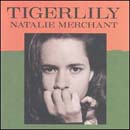 Natalie Merchant In looking at a lot of music criticism, you start to notice (if you do not merely accept everything critics say at face value) that most critics tend to hold on tight to what affected them deeply when they were most deeply affected by music (usually their late teens), and are passively reactionary regarding new music. They tend to respond favorably to what most reminds them of those powerful emotions they've tied to favorite albums 5, 10, 20 years past. Conversely, some critics employ exactly the opposite approach and just rave about everything that's new, until they get tired of it. Could I have begun this review more obliquely or with greater convolution of language? Well, if I hadn't, then the phrase "convolution of language" certainly answered that question. What I'm getting at is that there's a serious pitfall in reading any music criticism, and that's the fact that you're at the mercy of someone with their own agenda, not always telling things like they T-I-Is. Wait, was that a B-52s Good Stuff reference? Woof! Natalie Merchant is the perfect example hof what I'm talking about. Lots of critics hold on tightly to the 10,000 Maniacs era a bit too fondly, especially regarding In My Tribe, which is consistently held up to be some kind of masterpiece (at least to people who remember the album from their high school or college days). It's certainly a great album, but extremely naïve and awkward in spots, and I wonder whether Our Time in Eden, dismissed by many as derivative and samey, might not have been the band's true masterpiece. I think that album came out when I was just sick of the band, and I never really gave it a fair shake, but it really seems in hindsight that that album crystallized what 10,000 Maniacs had been brewing for years. It was a fitting final album for the Maniacs with Merchant as vocalist, and certainly set the stage for Merchant to become a superstar. Now, with a solo career that's gone on longer than her tenure with the Maniacs, Natalie Merchant is essential listening for soccer moms and college kids alike. Now I can't help but wonder if there was ever a genuine edge to her music in the first place. Tigerlily didn't seem that impressive when it came out, yet it's an album that proves itself to have been one of the finer pop albums of the decade, even though the dreary follow-up Ophelia tends to reinforce the idea that Merchant has nothing real to say. Her schoolgirl-poetry antics in 10,000 Maniacs seemed intriguing and charming, but they never convinced me she was deep. To me, actually referencing Jack Kerouac at all, much less in a song title ("Hey Jack Kerouac") is proof positive of someone who needs to get away from the library. (Then there's the REM connection, which is instant loss of credibility on top of it all.) Merchant's solo work has been less academic than her work with the Maniacs, more emotionally direct and honest. Tigerlily is a nice counterpart to Our Time in Eden; both stand as huge statements from an artist of substance. That said, I still prefer the less accomplished In My Tribe and Blind Man's Zoo, because, well, they're "my" Natalie Merchant albums. Tigerlily features "Carnival," "Wonder," and "Jealousy," all good singles, if a bit too VH1 for my taste these days. The album tracks are considerably more downbeat, as in the bleak album opener "San Andreas Fault" and the eight-minute adult-contemporary dirge "I May Know the Word." "Beloved Wife," replete with trademark Merchant vocal mistakes, is one of the two or three best songs she's ever done; "River," a somewhat too idealistic tribute to River Phoenix ("Let the youth of America mourn" … um, no thanks, I have to work that day), is not. "The Letter" is a beautiful ballad that stands alongside "Verdi Cries," but with more emotional directness (and slightly less of the wonderful drama). "Cowboy Romance" sounds like a James Taylor outtake, "Where I Go" like a mid-70s acoustic Grateful Dead outtake (maybe even a Jimmy Buffett track, come to think of it).Z "Seven Years," the closer, is another beautiful, downbeat broken love song, very strong. I suppose part of my problem is that this album came out right when I couldn't have cared less about it, and I've never really been able to regain the connection to it that I had with the mid-period Maniacs albums. Perhaps it's that the album is characterized by that VH1 slickness that makes other great albums (Car Wheels on a Gravel Road springs immediately to mind) seem less interesting than they maybe could be.
I kind of wish I'd have been born 5 or 6 years later, and that
way I know that these albums are some people's
to-die-for albums, and deservedly so. But there's a flatness here I
can't get past, whether it be mine or the album's. Objectively, it does
seem that Natalie Merchant writes the same songs over and over (on
Ophelia, for example, she pretty much is down to just one song, over and
over), so that's probably part of it too. Hm. I'm not sure I've said
anything helpful about this album, but I doubt anyone needs convincing or
un-convincing to make their decision on this album. Most will love it.
I like it, but it's not my favorite. Hm. I'm frustrated with this
review. I've never really encountered an album I like that I more wished
I loved. Well, who cares, I'm sure 95% of album sales on this stem from
BMG CD Club, so the pointlessness of reviewing it should have been
apparent from the get-go. Wait … who won here?
Review by Denver Fritz |